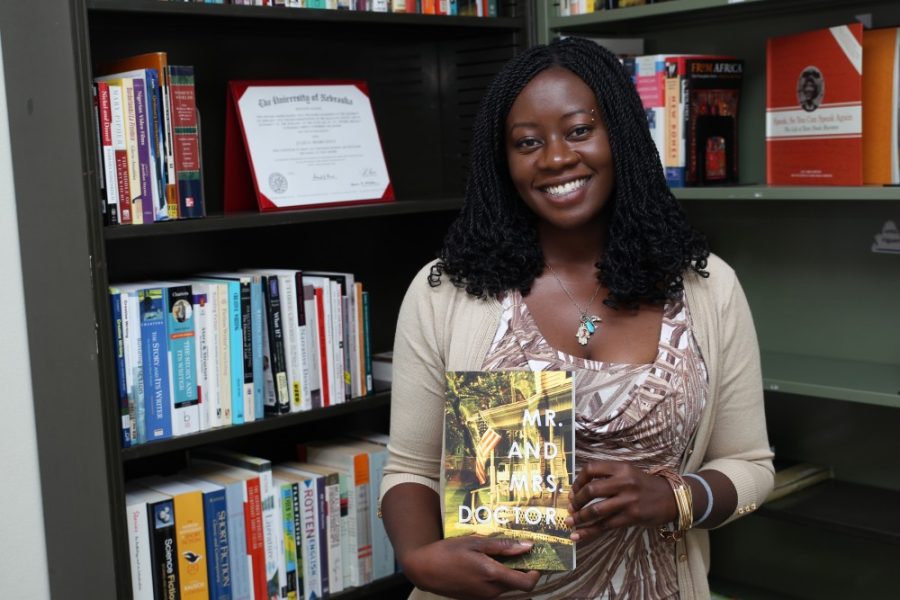Calling all Tucson book clubs and reading enthusiasts with an itch for something new and local. “Mr. and Mrs. Doctor” follows the journey of Nigerian immigrants Ifi and Job Obgannaya, who came together through an arranged marriage based on lies.
The couple lives in Nebraska where they face the stark realities of life as immigrants, the struggles of marriage with a stranger, marginalization in an already marginalized world and the American dream. “Mr. and Mrs. Doctor” is the first novel by Julie Iromuanya, an assistant professor in the Department of English. The novel has been recognized as a finalist for the 2016 PEN/Faulkner Award for Fiction as well as the 2016 PEN/Robert W. Bingham Prize for debut fiction.
Coffee House Press released “Mr. and Mrs. Doctor” in May 2015 and Iromuanya has since done readings on campuses and at festivals, including two different panels at the recent Tucson Festival of Books. Iromuanya has brought quality literature and acclaim to the UA with “Mr. and Mrs. Doctor.”
The inspiration for the widely well-received novel originated from a simple character sketch for an undergraduate fiction writing workshop. The idea began with thoughts about African immigration and the struggle that is present even today for Africans to assimilate into American culture.
“I didn’t know it was a book at the time,” Iromuanya said. “I did this composite character … and later I started doing research and thinking about what it means for a lot of African immigrants. This is changing, of course, but for a long time many African immigrants kind of rejected assimilation.”
The difficulty of assimilation was a topic that Iromauanya researched thoroughly when writing her book.
“Assimilation has been, for a very long time, this ideal that when you come over, you try as hard as you can to blend in and that requires you to lose a lot of your homeland and your culture,” Iromuanya said. “But what I found in my research is that there were a lot of African immigrants who were resisting that very strongly. So they could be thought of more as sojourners: People who came here very invested in succeeding economically and otherwise but not as invested in the social fabric. … In many ways, that can create problems.”
This research led to the first designs for the main character, Job, who comes to America to attend college and become a doctor. This, however, doesn’t work out like he may have hoped.
Ifi wouldn’t come to life until many years later, during a trip to Nigeria. Oftentimes children from poorer families have to work as household help for middle-class families. The children in these situations, however, are not necessarily in dire situations. In exchange for their work, the children receive food and shelter, and often have school expenses paid for while sending money home to their families.
Iromuanya acknowledged the initial shock of seeing young, prepubescent children working in homes away from their families, but also noted the inspiration that comes from the positive attitudes of these children.
“People were really proud of their work and very cognizant of the ways in which that position could help them,” Iromuanya said. “That was sort of the moment when the character Ifi came into the picture. What kind of situation would allow [a young girl in that position] to ascend economically and socially?”
The arranged marriage between Ifi and Job in the novel is not the forced archetype of child brides, however.
“It’s like the possibilities for her—she believes at least—are endless for the dreams that she wants to come true,” Iromuanya said.
Iromuanya juxtaposed the two characters to illustrate their views on what it means to be successful in America and what they want from America.
Iromuanya also invests in the marriage that now exists between Ifi and Job, strangers to each other beginning a life together. Iromuanya depicts their struggles with the lies that formed the foundation of their arrangement and how to try to get to know each other and make a relationship that has so much at stake work.
“How much is she invested in keeping up the lie?” Iromuanya said. “She sort of has to figure out how she wants to handle that, if she wants to expose him or if she will play along with it because of the status position that allows her among family and so on back home.”
Job is also revealed to have had a secret first wife in a green card marriage situation, which complicates their relationship more.
“They’re really two types of arranged marriages in the book,” Iromuanya said. “So, I also wanted to present a duality of the two types of arrangements.”
In the book, Job’s first wife* posses her own perspective on immigration as a lower-class, Midwestern woman trying to make ends meet. She feels a sort of cognitive dissonance between resentment toward immigrants like Job, and her necessity for the money that her green card marriage provided.
“Part of her character is like a little bit of desperation,” Iromuanya said. “The other side of it is a little bit of entitlement, too.”
With so many of the novel’s themes having relevance to society today, it is not hard to see why “Mr. and Mrs. Doctor” has received so much recognition.
Iromuanya advises student writers at the UA to save all their writings, as one thought can lead to great success.
The PEN/Faulkner Award ceremony will be on May 14 in Washington D.C. and the PEN/Robert W. Bingham Prize winner will be announced at the 2016 PEN Literary Awards Ceremony on April 11. As one of only five finalists for the PEN/Robert W. Bingham Prize and among the four for the PEN/Faulkner Award, Iromuanya’s recognition by such prestigious awards is an honor.
When one of our Wildcat professors has received such an honor, all of the UA is proud.
*Correction was made in the article from “Ifi” to “Job’s first wife.”
Follow Casey Aldava on Twitter.









